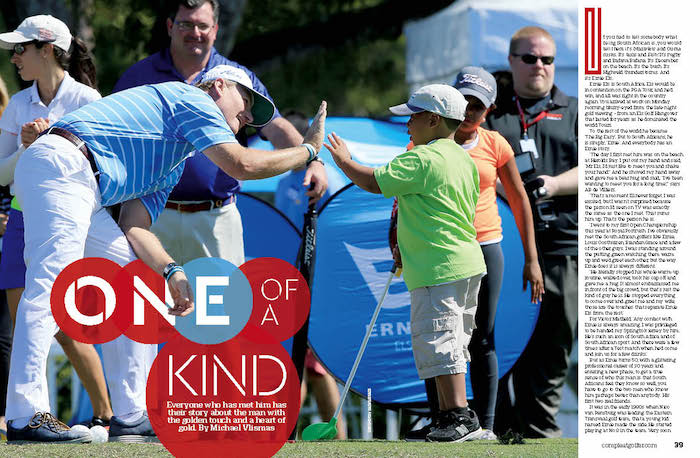Everyone who has met him has their story about the man with the golden touch and a heart of gold, writes MICHAEL VLISMAS in Compleat Golfer.
If you had to tell somebody what being South African is, you would tell them it’s braaivleis and Ouma rusks. It’s taxis and Eish! It’s rugby and Bafana Bafana. It’s December on the beach. It’s the bush. It’s Highveld thunderstorms. And it’s Ernie Els.
Ernie Els is South Africa. Els would be in contention on the PGA Tour, and he’d win, and all was right in the country again. You arrived at work on Monday morning blurry-eyed from the late-night golf viewing – from an Els Golf Hangover that lasted for years as he dominated the world Tours.
To the rest of the world he became ‘The Big Easy’. But to South Africans, he is simply, ‘Ernie’. And everybody has an Ernie story.
‘The day I first met him was on the beach at Herolds Bay. I put out my hand and said, “Mr Els, I’d just like to meet you and shake your hand.” And he shoved my hand away and gave me a bear hug and said, “I’ve been wanting to meet you for a long time,”’ says AB de Villiers.
‘That’s a moment I’ll never forget. I was excited, but I wasn’t surprised because the person I’d seen on TV was exactly the same as the one I met. That sums him up. That’s the person he is.
‘I went to my first Open Championship this year at Royal Portrush. I’ve obviously met the South African golfers like Ernie, Louis Oosthuizen, Branden Grace and a few of the other guys. I was standing around the putting green watching them warm up and we’d greet each other, but the way Ernie does it is always different.
‘He literally stopped his whole warm-up routine, walked over, took his cap off and gave me a hug. It almost embarrassed me in front of the big crowd, but that’s just the kind of guy he is. He stopped everything to come over and greet me and my wife; those are the touches that separate Ernie Els from the rest.’
For Victor Matfield, ‘Any contact with Ernie is always amazing. I was privileged to be handed my Springbok jersey by him. He’s such an icon of South Africa and of South African sport. And there were a few times after a Test match when he’d come and join us for a few drinks.’
But as Ernie turns 50, with a glittering professional career of 30 years and entering a new phase, to get a true sense of who this man is that South Africans feel they know so well, you have to go to the two men who know him perhaps better than anybody. His first two real friends.
It was in the early 1980s when Nico van Rensburg was leading the Eastern Transvaal golf team, that a young kid named Ernie made the side. He started playing at No 8 in the team. Very soon he was No 2. The only reason he wasn’t No 1 was that Van Rensburg was the captain and ‘I wasn’t going to let this whippersnapper go past me.’
A few years later, at the Transvaal Open, Des Terblanche was on golf leave from the army and first heard about this young kid Ernie from his friend Van Rensburg. Then he met this young kid Ernie in the playoff for that tournament. And he lost to this young kid Ernie. ‘That wasn’t great,’ he says, with a chuckle rolling up from the pit of his belly.
Right there began a friendship that has lasted to this day.
‘I used to stay at Ernie’s house every school holiday until matric because it was too far to travel from our home in Volksrust to all the South African Junior Golf Foundation tournaments that we played in the school holidays. Our dads were friends and Ernie’s dad, Neels, said I was welcome to stay with them so we could play the tournaments together,’ says Van Rensburg.
‘His dad had a clay tennis court in the yard. We would play tennis all day when I stayed there. Then I went away to school and when I came back the next holiday, his dad had replaced the tennis court with a chipping and putting green. So that was the end of our tennis.
‘We played a lot of golf together for the same provincial teams. I turned pro before Ernie because I was slightly older. But he was always that special talent. He was just that much better than the rest of us, and you could see it then already.’
Terblanche says the same.
‘In those days he was a step ahead of us, not only in talent but also in his mental approach. Ernie’s perseverance and hard work is unbelievable. People think he is just the guy who had bucketloads of talent, but they don’t realise how hard he worked. He has willpower of note and he’s determined. If he doesn’t get something right the first time, he tries again.
‘And then it all happened very quickly for him. In about two years he became one of the top players in the world.’
It’s Els’ consistent excellence at the highest level of the game – 758 consecutive weeks ranked inside the top 10 on the Official World Golf Ranking – that is so respected by his friends and fellow sports stars.
‘I don’t think people appreciate how good he was when you look at how long he was in the top 10 in the world and the number of tournaments he’s won,’ says Matfield. ‘I had a few friends who went to The Masters and they told me that apart from Tiger Woods, Ernie is the next biggest star in people’s minds. Everybody wants to greet him and see him.’
For Van Rensburg, a story about Els’ pilots is the perfect reflection of his longevity at the highest level of the game.
‘He was so good for so long. I’ll never forget when he bought his plane. The one Friday night he phoned the pilots who for four years had been flying him around the world to tournaments to tell them he’d missed the cut and they must get the plane ready. The pilots asked him, “What’s a cut?” After spending so much time with him and him playing so well for so long, they had no idea what a cut was because he so rarely missed one. In their minds, they flew in on Monday and out on Sunday.’
For Gary Player, the embodiment of longevity in golf, Els’ sustained excellence is what he also admires about the man who followed him as South Africa’s next global golf superstar.
‘What impresses me the most about the four Major championships that Ernie won is they were over 18 years – his first US Open in 1994 and then his most recent at The Open in 2012. Longevity in golf is definitely a key factor when talking about any player’s career.’
Terblanche sees another side of this.
‘You know, the game has changed so much. In my day, the guy who could handle his hangover the best won the tournament. Not today. Now you have personal trainers and sport psychologists. But Ernie adapted and kept pace with all these changes in the game, which a lot of us never did. As a result, he is easily one of the most successful sportsmen we’ve ever had. He was consistently good. Ernie was in the top 10 in the world for years and I think that will forever be one of his greatest achievements in golf.’
But when it comes to Els’ consistency, De Villiers says there is another element of this that he admires even more than
the golfer’s career record.
‘The legacy Ernie will leave is consistency, but in my opinion it will be more so as a person than even a professional golfer. A lot of sportsmen go through ups and downs in their careers, and their personality or their character changes. But I can’t remember Ernie changing at all during his career. He’s always just been Ernie Els, through the highs and the lows. He’s maintained the same character and personality, which is something I admire.
‘My life stops when Ernie is in contention – 100%, no doubt about it. And even when he’s not, I’m praying he can somehow make a few birdies and get in contention. I’ve certainly been in a few bad moods in the past where I’ve found myself on a cricket pitch while Ernie is busy winning The Open or another big tournament. I’ve spent many hours with my brothers in front of the television watching him throughout the night at the US tournaments. If Ernie
is in contention, there’s no place I’d rather be than watching it.’
Perhaps the reason De Villiers admires Els’ consistency of character so much is that he also knows how hard it can be to be Ernie Els. To be constantly in the public eye and in demand, and not allow this to change you.
‘The values my parents put in place were nailed down from an early age – to be humble, have discipline and acknowledge and respect other people. And it’s definitely something I could relate to with Ernie when I saw him and the way he played, the way he addresses the media and makes time for other people.
‘Ernie’s character and personality are what make him stand out so much. He is possibly the most grounded person I’ve met in my life. He always makes time for people. I could see the difference in him on the TV when I was growing up and when he was my role model. He’s still my role model. But you could see through the TV screen that he’s a gentle soul. For me, at a very young age, he stood out above all of the other golfers I followed as somebody who has immense character.’
Matfield says the same about Els, highlighting his humility as something he’s always respected.
‘He’s such a down-to-earth guy. He’s always got time for people. When I first started playing golf I used to hit a big fade off the tee with my driver. One morning Ernie and I were on the range hitting a few balls, and he came over and said: “Just keep your shoulder behind the ball when you’re on your backswing.” And that one tip changed my whole drive.
Now I can hit draws and everything. He’s just got that time for you.’
Terblanche believes it harks back to how Els was raised.
‘His family never made a big deal out of him. They always treated him like the little brother in the family, and I think that helped him in a way. That kept him grounded. Besides, I’m the first guy who’ll remind him if he ever gets too big for his boots.
‘But seriously, you know, when you’re Ernie Els it’s a whole different life. There were times he didn’t want to go out any more because somebody always wanted something from him. So we’d sit in the hotel room and chat. Even at his home
in Herolds Bay, some guy would just walk in off the street to his front door and knock, and bug him about something. It can be a tough life.’
Van Rensburg has seen his friend deal with this on many occasions.
‘I’ve never seen him say no to an autograph. But I remember one occasion we were eating together. He had just put a bite of food in his mouth when a man walked past and grabbed his shoulder and asked him to sign something. Ernie said, “I’m just eating here.” But as the man walked off, he put down his fork, walked after the man and said, “OK, let me sign that for you.”’
And then there is the golf. And herein lies another misconception people have about Els.
‘People don’t realise how golf-crazy Ernie is. He doesn’t really have hobbies. He’s not the kind of guy to go fishing or anything like that,’ says Van Rensburg. ‘I had to meet him for a quick business trip once and we had to sort out a few things, but as soon as I got there he said: ‘Come, we’re going to go play a quick nine holes.’
‘It’s a good lesson for the youngsters, who I think don’t play enough. Ernie would play between 30 and 33 tournaments every year. The young guys don’t come close to that. And Ernie never chased the money. It’s never been about the money for him. He is about winning. He hates second. When they were both at the top of their games,
it’s crazy how much Tiger Woods drove Ernie, and I think Ernie also drove Tiger.’
Terblanche says Els has always been one of the most driven golfers he’s known, and it’s a trait he brings to anything he takes on – in business too.
‘He’s hands-on with his businesses. He’s not an easy man to work for because he has very high standards. He keeps everyone on their toes. He’s never satisfied with second best, and whatever he does, he does well.’
It’s for this reason that Terblanche believes Els will clean up on the senior circuit. ‘If he’s hungry for that Tour, I guarantee you it will be a problem for his opponents.’
And on the senior Tour, there will no doubt be more Ernie Els stories to come. Because everybody has an Ernie Els story.
For De Villiers, it’s one that again highlights the man’s character.
‘I played golf with him at Oubaai and we were walking down the fairway when he went off in his own direction into the rough because a little boy was standing there. Ernie went and introduced himself and took a photo with the boy. He’s always got time and those little touches that I don’t think a lot of other sports stars make time for.’
For Gary Player, it’s the 2003 Presidents Cup showdown with Tiger Woods.
‘They were the two leading golfers in the world at the time, and their faceoff was legendary. Ernie lost to Tiger in the singles but after some 30-plus matches, we were tied with the Americans. It was back and forth in the playoff. Ernie knocks in a 12-footer to halve. Then the next hole, Tiger sinks a remarkable 15-footer. With enormous pressure in our home country, Ernie holes another putt to halve that hole.
‘Because it was so dark we would have all had to come back the next day, but in the spirit of competition it was decided by Jack Nicklaus and myself that The Presidents Cup should end in a tie. I will forever be proud of how Ernie handled himself in that moment. He is a special man and a true South African patriot.’
For Terblanche, it’s something about this kid Ernie that he’s always loved.
‘If you had a bad tournament, he had a way to cheer you up. It’s actually that smile of his. When he gives you that smile, you just feel better.’








